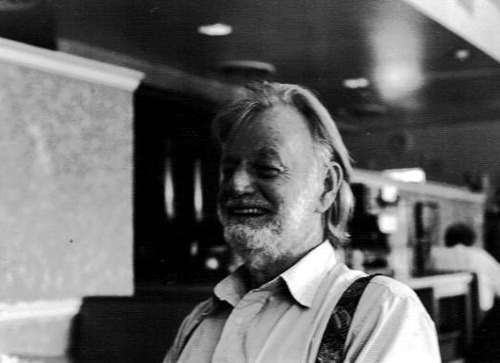
Only when I’mAnybody who’s read my poetry can probably figure out what draws me to that poem. (Side note: I’ve been accused of “uterus envy.”) More than that, though, I think I’ve always felt a kinship with him, even know we never met (I learned about his work in 2001 or so, and he died a year later). As I said, Huff published mostly in underground journals, though he did dabble in university-affiliated magazines from time to time. I’m kind of on the other side of that. I have a lot of publications in indie places (including my fantasy novels, which are all in a small/indie press), but a lot of my poems are in university-affiliated journals. Nevertheless, I get the feeling that we both simultaneously inhabit different worlds (though I think he was probably better at it than I am). For example, neo-hipsters usually don’t like me because I use bad words like craft and revision. I also use “traditional” punctuation (aka “punctuation”) and I have no patience for broets (whom I equate with bullies). But academic poets don’t know what to do with me, either, because I despise pretension. Put another way, I’m willing to write about shit—I mean, literal shit—which is something an academic poet probably wouldn’t do, but I’d sooner die than do what a neo-hipster would do, which is simply write a shock-jock piece that is nothing but synonyms for feces (a routine I must have seen at least four times at AWP now).
writing do I
understand my mother:
that kind of
caring that
wants more for
something to be
than for itself
to continue.
OK, enough about me and my ranting. If you haven’t checked out Huff’s selected, Why I Write in Coffee Houses and Diners, please do. In the meantime, here a few more of his poems, some of which don’t have titles.
Cafe Poem
The woman in
the corner,
white on black,
white skin,
black hair,
black dress,
lights a
long, white
cigarette,
the orange flame
bright
against her cheek.
The Lost Poem
My father carried a poem with
him all through his internment
in Cabanatuan prison camp in
the Phillipines, carried it
with him for four years, showed
it to me one day folded and
refolded, print blurred, coming
apart. I, in my teens, not
thinking, nodded and went on
and forgot. Years later, I
tried to recall what poem it
was, even a single line of it
but it was gone. The years
go by, my mother’s dead this
long time. There’s no one to
ask. So I ponder it. And
ponder motivations, what drives
us, ponder what drives me still
to write with the same intensity
after all these years. And ponder
the lost poem. Perhaps that’s
part of it: I’m driven to create
that poem I can’t recall, the
poem that carried him through
four years of Hell and home
again. Or perhaps I’m driven
to write a poem that will serve
someone else as well. It’s a
nice thought anyway: my poem
in someone's pocket, bent and
faded, nourishing him, healing
him through his own private
Hell. A man could do worse
with his life. I evoke my
father’s image, our eyes meet,
he nods in agreement, starts
to speak then turns and walks
off into the distance, bearing
the lost poem with him.
Write on my tombstone:
Once so easily distracted,
now focused.
We forget we're
mostly water
till the rain falls
and every atom
in our body
starts to go home.
I think there is a way
to sculpt silence.
Perhaps that’s what
poems are:
sculptures of silence.
We have to learn
not to replace
perception with knowledge.
Forget science.
Pierced by starlight,
I know what a star is.
Claiming the Dead
They asked him if he
wanted the body. He said
No, he didn't want it.
They said Somebody's got
to claim it. He said Why?
They said So it can be
buried. He said You mean
they won't bury it if
nobody claims it. They
said Well, after a while.
He said Well, there's
no hurry. They said Well,
most people want to
claim the body and
give it a decent funeral.
He said Do you think
she gives a damn? They
said We can't make you
claim it. He said Then
I'm not going to. Any
business we had ended
when she did that. I'm
not mad but I was never
anyone to clean up after
anybody else and I don't
intend to start now.
No comments:
Post a Comment